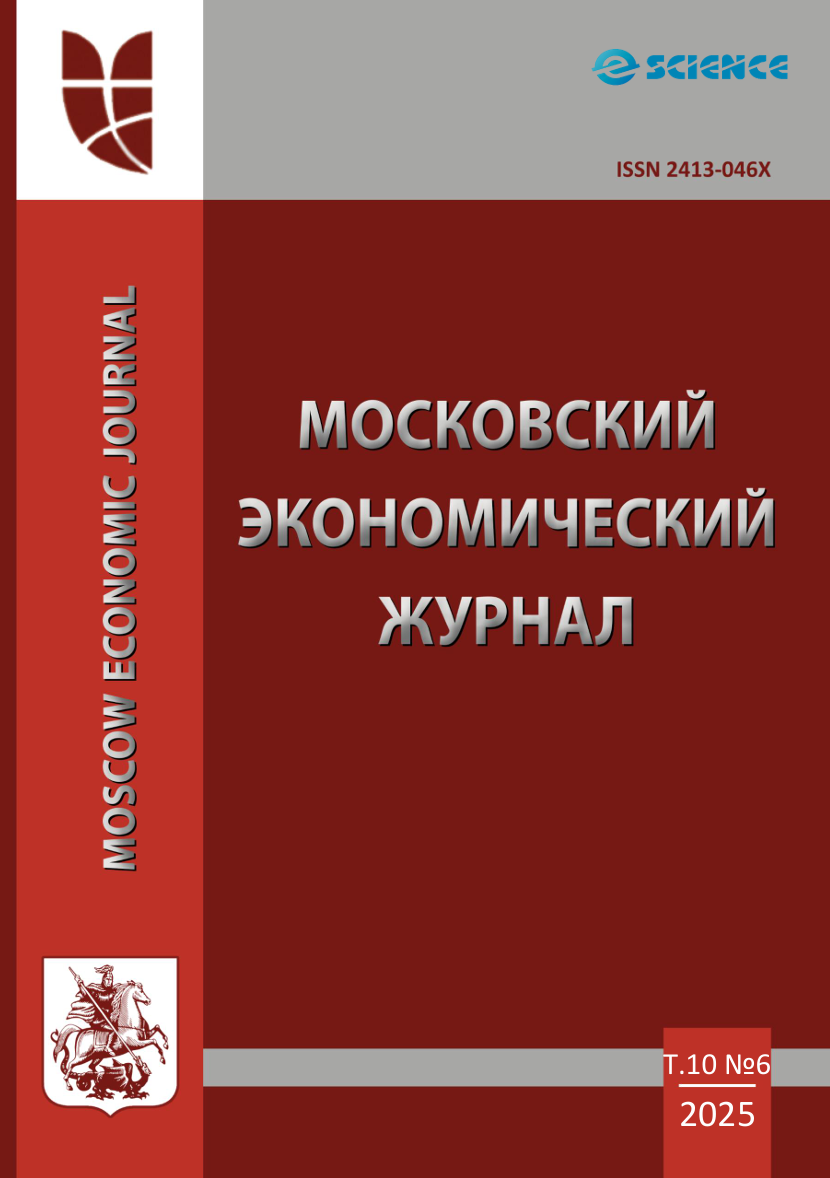graduate student from 01.01.2021 to 01.01.2025
UDC 339.9
The article presents research results dedicated to analyzing the prospects and barriers of implementing artificial intelligence (AI) technologies in the sphere of foreign economic activity (FEA) of the Russian Federation. The aim of the work is to identify key opportunities for applying AI at various stages of FEA (market analysis, supply organization, customs clearance) and to develop proposals for the digital transformation of this sphere. The research methodology is based on the analysis of theoretical frameworks, typical AI use cases (machine learning, natural language processing, computer vision, robotic process automation), and an assessment of their current level of practical implementation within the Russian context, including an analysis of specific projects (KPS "Kaskad", "Kontur.Deklarant" service, the intelligent checkpoint model). The study's results revealed significant unrealized potential of AI for optimizing FEA, including demand forecasting, automation of customs procedures, risk management, image recognition, and document analysis. However, it was established that the current level of AI integration varies from low (market analysis) to medium (supply organization, customs clearance). The main barriers identified are the insufficient technological base of enterprises and customs authorities, a shortage of qualified personnel, and the conceptual substitution of intellectualization (using AI) with mere automation. Based on the conducted analysis, the author proposes specific development drivers: the development of AI tools for market analysis and risk management, modernization of checkpoint infrastructure using robotics and IoT, and the creation of a complementary intelligent checkpoint model. The conclusion emphasizes the necessity of a practice-oriented approach to AI implementation, taking into account the existing technological foundation, to enhance the efficiency and competitiveness of Russian FEA.
artificial intelligence, digitalization, intellectualization, intelligent customs, foreign economic activity, intelligent border checkpoint, customs control, automation
1. Andreeva E.I. Iskusstvennyy intellekt i perspektivy ego ispol'zovaniya pri identifikacii tovarov v tamozhennyh celyah // Vestnik Rossiyskoy tamozhennoy akademii. 2021. №1 (54). URL: https://cyberleninka.ru/article/n/iskusstvennyy-intellekt-i-perspektivy-ego-ispolzovaniya-pri-identifikatsii-tovarov-v-tamozhennyh-tselyah (data obrascheniya: 25.01.2025).
2. Bashly P.N. O realizacii modeli intellektual'nogo punkta propuska // Osobennosti gosudarstvennogo regulirovaniya vneshneekonomicheskoy deyatel'nosti v sovremennyh usloviyah: materialy VII Vserossiyskoy nauchno-prakticheskoy konferencii. Rostov n/D: Rossiyskaya tamozhennaya akademiya, Rostovskiy filial, 2020. – S. 55–61.
3. Eremina O.A. Iskusstvennyy intellekt kak faktor razvitiya vneshneekonomicheskoy deyatel'nosti Rossii // Ekonomicheskie issledovaniya i razrabotki, 2024. URL: http://edrj.ru/article/09-09-24 (data obrascheniya: 25.01.2025).
4. Pavlyukevich V.K., Cirkunov P.I. Razvitie iskusstvennogo intellekta v sfere tamozhennoy deyatel'nosti. Elektronnyy nauchnyy zhurnal "Molodaya nauka Sibiri", 2025. №4 (26). URL: https://ojs.irgups.ru/index.php/mns/article/view/1909 (data obrascheniya: 29.01.2025).
5. Pasport nacional'nogo proekta «Nacional'naya programma Cifrovaya ekonomika Rossiyskoy Federacii» (utv. prezidiumom Soveta pri Prezidente RF po strategicheskomu razvitiyu i nacional'nym proektam, protokol ot 04.06.2019 № 7) // Garant. URL: https://base.garant.ru/72296050/ (data obrascheniya: 26.03.2025).
6. Savinov Yu.A., Taranovskaya E.V. Iskusstvennyy intellekt v mezhdunarodnoy torgovle // Rossiyskiy vneshneekonomicheskiy vestnik. 2024. №4. S. 58–71. https://doi.org/10.24412.2072-8042-2020-00037 (data obrascheniya: 29.01.2025).
7. Snapkova O.V. Problemy sozdaniya "intellektual'nogo punkta propuska" // Vestnik Rossiyskoy tamozhennoy akademii. 2022. №3 (60). URL: https://cyberleninka.ru/article/n/problemy-sozdaniya-intellektualnogo-punkta-propuska (data obrascheniya: 29.01.2025).
8. FTS Rossii. Itogovyy doklad o rezul'tatah deyatel'nosti za 2024 god. S. 81. URL: https://customs.gov.ru/storage/document/document_info/2025-03/14/itog_doklad_2024.pdf (data obrascheniya: 28.02.2025).
9. Haydobin A.A. Primenenie iskusstvennogo intellekta v VED: vzglyad tamozhni i biznesa // N.Eks.T. 2022. №4 (20). URL: https://cyberleninka.ru/article/n/primenenie-iskusstvennogo-intellekta-v-ved-vzglyad-tamozhni-i-biznesa (data obrascheniya: 29.03.2025).
10. Breinlich, Holger; Corradi, Valentina; Rocha, Nadia; Ruta, Michele; Santos Silva, J.M.C.; Zylkin, Tom. Machine Learning in International Trade Research: Evaluating the Impact of Trade Agreements. Policy Research Working Paper; No. 9629. World Bank, 2021. URL: http://hdl.handle.net/10986/35451 (data obrascheniya: 29.03.2025).
11. Gartner. Gartner Hype Cycle, How do Hype Cycles work? URL: https://www.gartner.com/en/research/methodologies/gartner-hype-cycle (data obrascheniya: 29.03.2025).
12. IBM. What is AI? URL: https://www.ibm.com/think/topics/artificial-intelligence (data obrascheniya: 25.03.2025).
13. Mashaabi, Malak; Alotaibi, Areej; Qudaih, Hala; Alnashwan, Raghad; Al-Khalifa, Hend. Natural Language Processing in Customer Service: A Systematic Review. arXiv preprint, 2022. URL: https://arxiv.org/abs/2212.09523 DOI:https://doi.org/10.48550/arXiv.2212.09523 (data obrascheniya: 29.03.2025).
14. World Customs Organization, World Trade Organization. The role of advanced technologies in cross-border trade: A customs perspective. P. 34. URL: https://www.tfafacility.org/sites/default/files/2022-08/WCOWTOPUB.pdf (data obrascheniya: 29.03.2025).











